1, What is a deadlock
For example, if thread a occupies resource 1, thread b occupies resource 2, thread b needs resource 1 and thread a needs resource 2, a deadlock will occur
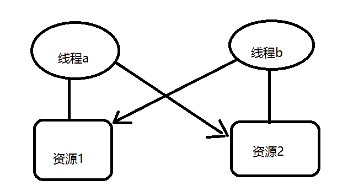
In the deadlock solution, log and gdb debugging can be used when the number of threads is small
log and gdb cannot be used to solve the problem of too many threads
Another example is three threads
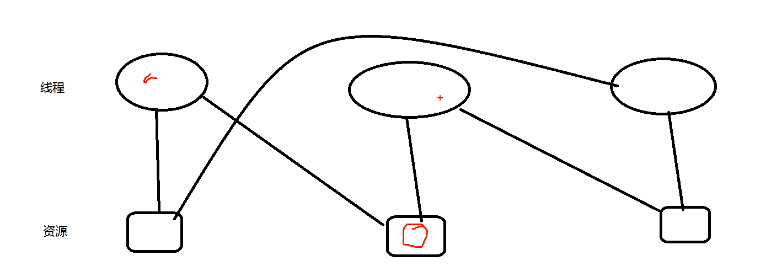
Thread a wants the resources of thread B, thread B wants the resources of thread C, and thread C wants the resources of thread A. This forms a directed graph loop
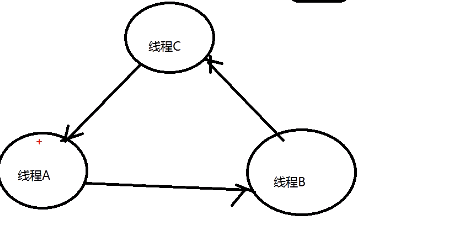 For another example, as shown in the figure below, thread A wants to obtain the lock of thread B, thread B wants to obtain the lock of thread C, thread C wants to obtain the lock of thread D, and thread D wants to obtain the lock of thread A, so A resource acquisition ring is constructed.
For another example, as shown in the figure below, thread A wants to obtain the lock of thread B, thread B wants to obtain the lock of thread C, thread C wants to obtain the lock of thread D, and thread D wants to obtain the lock of thread A, so A resource acquisition ring is constructed.
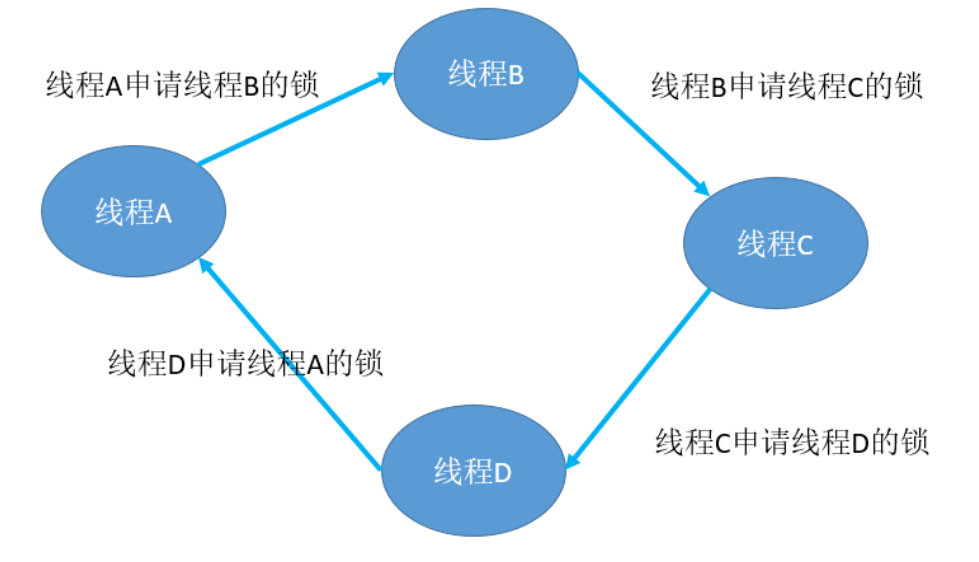
To sum up
Deadlock refers to a deadlock caused by multiple threads or processes competing for resources during operation. When processes or threads are in this deadlock state, they will not be able to move forward without external force.
Here we can transform the deadlock problem into the loop problem of a directed graph
2, Deadlock detection
Deadlock detection principle
The resource acquisition ring can be stored by graph and directed graph. If thread A obtains the lock occupied by thread B, thread A points to thread B. How do I set the lock occupied by thread B? Run process thread B to obtain A successful lock. The principle of detection uses another thread to detect whether there is A ring in the graph process.
We can divide the deadlock detection problem into the following parts
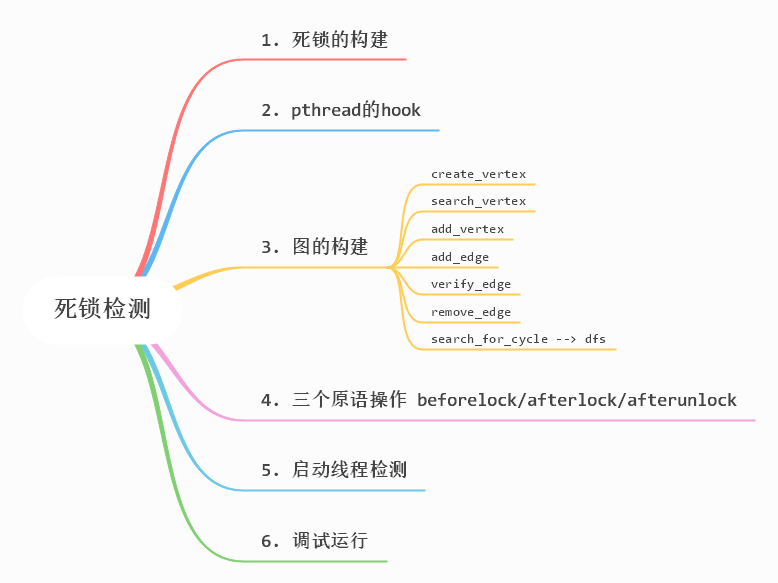
1. Construction of deadlock
#define _GNU_SOURCE
#include <dlfcn.h>
#include <stdio.h>
#include <unistd.h>
#include <pthread.h>
#include <stdlib.h>
#include <stdint.h>
pthread_mutex_t mtx1 = PTHREAD_MUTEX_INITIALIZER;
pthread_mutex_t mtx2 = PTHREAD_MUTEX_INITIALIZER;
pthread_mutex_t mtx3 = PTHREAD_MUTEX_INITIALIZER;
pthread_mutex_t mtx4 = PTHREAD_MUTEX_INITIALIZER;
void *thread_routine_a(void *arg) {
printf("thread_routine a \n");
pthread_mutex_lock(&mtx1);
sleep(1);
pthread_mutex_lock(&mtx2);
pthread_mutex_unlock(&mtx2);
pthread_mutex_unlock(&mtx1);
printf("thread_routine a exit\n");
}
void *thread_routine_b(void *arg) {
printf("thread_routine b \n");
pthread_mutex_lock(&mtx2);
sleep(1);
pthread_mutex_lock(&mtx3);
pthread_mutex_unlock(&mtx3);
pthread_mutex_unlock(&mtx2);
printf("thread_routine b exit \n");
}
void *thread_routine_c(void *arg) {
printf("thread_routine c \n");
pthread_mutex_lock(&mtx3);
sleep(1);
pthread_mutex_lock(&mtx4);
pthread_mutex_unlock(&mtx4);
pthread_mutex_unlock(&mtx3);
printf("thread_routine c exit \n");
}
void *thread_routine_d(void *arg) {
printf("thread_routine d \n");
pthread_mutex_lock(&mtx4);
sleep(1);
pthread_mutex_lock(&mtx1);
pthread_mutex_unlock(&mtx1);
pthread_mutex_unlock(&mtx4);
printf("thread_routine d exit \n");
}
int main() {
pthread_t tid1, tid2, tid3, tid4;
pthread_create(&tid1, NULL, thread_routine_a, NULL);
pthread_create(&tid2, NULL, thread_routine_b, NULL);
pthread_create(&tid3, NULL, thread_routine_c, NULL);
pthread_create(&tid4, NULL, thread_routine_d, NULL);
pthread_join(tid1, NULL);
pthread_join(tid2, NULL);
pthread_join(tid3, NULL);
pthread_join(tid4, NULL);
}
This is the operation of deadlock. You can't print the last print statement of each thread, but only the first one

In terms of cpu utilization, there is no change. The mutex lock used is like this. If it is replaced with spin_lock will cause the cpu to run full
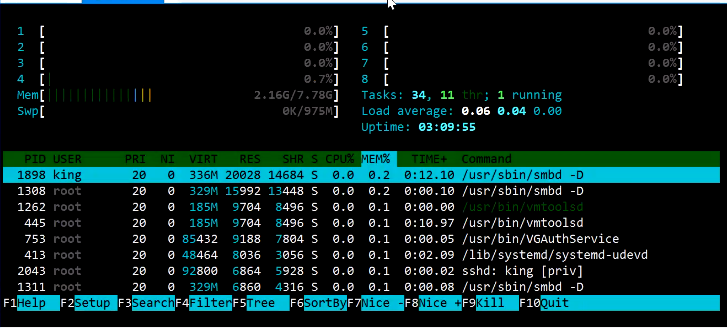 The problem of deadlock turns to the detection of directed graph
The problem of deadlock turns to the detection of directed graph
2. The problem is how to achieve which thread holds the lock, and how to build a directed graph through thread relationship
Using hook, we can see which thread is tied to id
#define _GNU_SOURCE / / adding this macro will enable some functions of the following header file
#include <dlfcn.h>
#include <stdio.h>
#include <unistd.h>
#include <pthread.h>
#include <stdlib.h>
#include <stdint.h>
pthread_mutex_t mtx1 = PTHREAD_MUTEX_INITIALIZER;
pthread_mutex_t mtx2 = PTHREAD_MUTEX_INITIALIZER;
pthread_mutex_t mtx3 = PTHREAD_MUTEX_INITIALIZER;
pthread_mutex_t mtx4 = PTHREAD_MUTEX_INITIALIZER;
//We implement our own lock and unlock functions. How can we call the lock function in the library? We use hook
typedef int (*pthread_mutex_lock_t)(pthread_mutex_t *mutex);
pthread_mutex_lock_t pthread_mutex_lock_f;//Use the function pointer to connect the pointer of the library function
typedef int (*pthread_mutex_unlock_t)(pthread_mutex_t *mutex);
pthread_mutex_unlock_t pthread_mutex_unlock_f;
int pthread_mutex_lock(pthread_mutex_t *mutex)
{
printf("pthread_mutex_lock selfid %ld, mutex: %p\n", pthread_self(), mutex);
pthread_mutex_lock_f(mutex);
}
int pthread_mutex_unlock(pthread_mutex_t *mutex)
{
printf("pthread_mutex_unlock\n");
pthread_mutex_unlock_f(mutex);
}
static int init_hook() {
pthread_mutex_lock_f = dlsym(RTLD_NEXT, "pthread_mutex_lock");//Before calling this library function, hijack the pointer of this library function and assign it to another function pointer for calling, which can solve the problem that the original library function cannot be used because of overloading the library function
pthread_mutex_unlock_f = dlsym(RTLD_NEXT, "pthread_mutex_unlock");
}
void *thread_routine_a(void *arg) {
printf("thread_routine a \n");
pthread_mutex_lock(&mtx1);
sleep(1);
pthread_mutex_lock(&mtx2);
pthread_mutex_unlock(&mtx2);
pthread_mutex_unlock(&mtx1);
printf("thread_routine a exit\n");
}
void *thread_routine_b(void *arg) {
printf("thread_routine b \n");
pthread_mutex_lock(&mtx2);
sleep(1);
pthread_mutex_lock(&mtx3);
pthread_mutex_unlock(&mtx3);
pthread_mutex_unlock(&mtx2);
printf("thread_routine b exit \n");
}
void *thread_routine_c(void *arg) {
printf("thread_routine c \n");
pthread_mutex_lock(&mtx3);
sleep(1);
pthread_mutex_lock(&mtx4);
pthread_mutex_unlock(&mtx4);
pthread_mutex_unlock(&mtx3);
printf("thread_routine c exit \n");
}
void *thread_routine_d(void *arg) {
printf("thread_routine d \n");
pthread_mutex_lock(&mtx4);
sleep(1);
pthread_mutex_lock(&mtx1);
pthread_mutex_unlock(&mtx1);
pthread_mutex_unlock(&mtx4);
printf("thread_routine d exit \n");
}
int main() {
init_hook();
pthread_t tid1, tid2, tid3, tid4;
pthread_create(&tid1, NULL, thread_routine_a, NULL);
pthread_create(&tid2, NULL, thread_routine_b, NULL);
pthread_create(&tid3, NULL, thread_routine_c, NULL);
pthread_create(&tid4, NULL, thread_routine_d, NULL);
pthread_join(tid1, NULL);
pthread_join(tid2, NULL);
pthread_join(tid3, NULL);
pthread_join(tid4, NULL);
}
We can see the corresponding thread id and lock id, which is the result of using hook
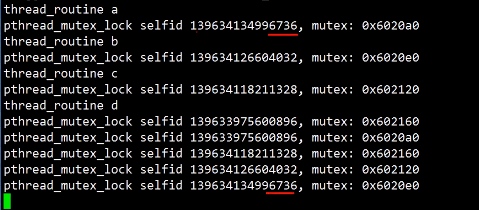
3. Let's build a directed graph
The ring judgment operation of graph, using dfs
#define _GNU_SOURCE / / adding this macro will enable some functions of the following header file
#include <dlfcn.h>
#include <stdio.h>
#include <unistd.h>
#include <pthread.h>
#include <stdlib.h>
#include <stdint.h>
#define MAX 100
enum Type {PROCESS, RESOURCE};
struct source_type {
uint64 id;
enum Type type;
uint64 lock_id;
int degress;
};
struct vertex {
struct source_type s;
struct vertex *next;
};
//
struct task_graph {
struct vertex list[MAX]; // <selfid , thid>
int num;
struct source_type locklist[MAX]; // thid = get_threadid_from_mutex(mutex); id of lock
int lockidx;
pthread_mutex_t mutex;
};
struct task_graph *tg = NULL;
int path[MAX+1];
int visited[MAX]; //Whether the node is accessed
int k = 0;
int deadlock = 0;
struct vertex *create_vertex(struct source_type type) {
struct vertex *tex = (struct vertex *)malloc(sizeof(struct vertex ));
tex->s = type;
tex->next = NULL;
return tex;
}
int search_vertex(struct source_type type) {
int i = 0;
for (i = 0;i < tg->num;i ++) {
if (tg->list[i].s.type == type.type && tg->list[i].s.id == type.id) {
return i;
}
}
return -1;
}
void add_vertex(struct source_type type) {
if (search_vertex(type) == -1) {
tg->list[tg->num].s = type;
tg->list[tg->num].next = NULL;
tg->num ++;
}
}
int add_edge(struct source_type from, struct source_type to) {
add_vertex(from);
add_vertex(to);
struct vertex *v = &(tg->list[search_vertex(from)]);
while (v->next != NULL) {
v = v->next;
}
v->next = create_vertex(to);
}
int verify_edge(struct source_type i, struct source_type j) {
if (tg->num == 0) return 0;
int idx = search_vertex(i);
if (idx == -1) {
return 0;
}
struct vertex *v = &(tg->list[idx]);
while (v != NULL) {
if (v->s.id == j.id) return 1;
v = v->next;
}
return 0;
}
int remove_edge(struct source_type from, struct source_type to) {
int idxi = search_vertex(from);
int idxj = search_vertex(to);
if (idxi != -1 && idxj != -1) {
struct vertex *v = &tg->list[idxi];
struct vertex *remove;
while (v->next != NULL) {
if (v->next->s.id == to.id) {
remove = v->next;
v->next = v->next->next;
free(remove);
break;
}
v = v->next;
}
}
}
void print_deadlock(void) {
int i = 0;
printf("deadlock : ");
for (i = 0;i < k-1;i ++) {
printf("%ld --> ", tg->list[path[i]].s.id);
}
printf("%ld\n", tg->list[path[i]].s.id);
}
int DFS(int idx) {
struct vertex *ver = &tg->list[idx];
if (visited[idx] == 1) {
path[k++] = idx;
print_deadlock();
deadlock = 1;
return 0;
}
visited[idx] = 1;
path[k++] = idx;
while (ver->next != NULL) {
DFS(search_vertex(ver->next->s));
k --;
ver = ver->next;
}
return 1;
}
int search_for_cycle(int idx) {//Ring judgment operation
struct vertex *ver = &tg->list[idx];
visited[idx] = 1;
k = 0;
path[k++] = idx;
while (ver->next != NULL) {
int i = 0;
for (i = 0;i < tg->num;i ++) {
if (i == idx) continue;
visited[i] = 0;
}
for (i = 1;i <= MAX;i ++) {
path[i] = -1;
}
k = 1;
DFS(search_vertex(ver->next->s));
ver = ver->next;
}
}
int main() {
tg = (struct task_graph*)malloc(sizeof(struct task_graph));
tg->num = 0;/How many nodes
struct source_type v1;
v1.id = 1;
add_vertex(v1);
struct source_type v2;
v2.id = 2;
add_vertex(v2);
struct source_type v3;
v3.id = 3;
add_vertex(v3);
struct source_type v4;
v4.id = 4;
add_vertex(v4);//Construct 4 nodes
add_edge(v1, v2);
add_edge(v2, v3);
add_edge(v1, v3);
add_edge(v3, v4);
add_edge(v4, v1);//Structural directed edge
search_for_cycle(search_vertex(v1));//Judge the ring from v1 node
}
To build such a graph, there are two rings
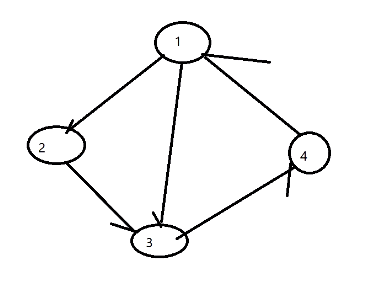
There are two rings searched here

We have the algorithm of graph
Then how do we judge deadlocks and how do we use locks to build a graph`
We use three primitive operations: before lock, after lock and after unlock to construct the relationship of directed graph
int search_lock(uint64 mutex) {
int idx = 0;
for (idx = 0;idx < tg->lockidx;idx ++) {//Total number of traversal locks
if (mutex == tg->locklist[idx].lock_id) {//Is the lock occupied
return idx;
}
}
return -1;
}
int search_empty_lock() {
int idx = 0;
for (idx = 0;idx < tg->lockidx;idx ++) {
if (0 == tg->locklist[idx].lock_id) {
return idx;
}
}
return tg->lockidx;
}
void beforelock(uint64 threadid, uint64 mutex) {//The first parameter is the thread id and the second is the lock
//Whether the lock is occupied by a thread. If it is occupied, the lock corresponds to that thread, and the current lock points to the current thread. If it points to the thread occupied by the lock, an edge is added
int idx = 0; //lockidx sum
for (idx = 0;idx < tg->lockidx;idx ++) { // Total number of traversal locks
//self thid
if (mutex == tg->locklist[idx].lock_id) {//Is the lock occupied
//self --> thid
struct source_type from;
from.id = threadid;//Thread id
add_vertex(from);//Build an edge
struct source_type to;
to.id = tg->locklist[idx].id;
add_vertex(to);
if (!verify_edge(from, to)) {//First judge whether this edge exists
add_edge(from, to);
}
}
}
}
//int inc(*)
void afterlock(uint64 threadid, uint64 mutex) {
//
int idx = 0;
if (-1 == (idx = search_lock(mutex))) { //Lock or not
int emp_idx = search_empty_lock(mutex);
tg->locklist[emp_idx].id = threadid;
tg->locklist[emp_idx].lock_id = mutex;
tg->lockidx ++; //atomic
} else {//Locked before
struct source_type from;
from.id = threadid;
add_vertex(from);
struct source_type to;
to.id = tg->locklist[idx].id;
add_vertex(to);
if (!verify_edge(from, to)) {
remove_edge(from, to);//Remove this edge
}
tg->locklist[idx].id = threadid;
}
}
void afterunlock(uint64 threadid, uint64 mutex) {//Release all
int idx = search_lock(mutex);
if (tg->locklist[idx].degress == 0) {
tg->locklist[idx].id = 0;
tg->locklist[idx].lock_id = 0;
}
}
3, Implementation of deadlock detection
#define _GNU_SOURCE
#include <dlfcn.h>
#include <stdio.h>
#include <pthread.h>
#include <unistd.h>
#include <stdlib.h>
#include <stdint.h>
#include <unistd.h>
#define THREAD_NUM 10
typedef unsigned long int uint64;
typedef int (*pthread_mutex_lock_t)(pthread_mutex_t *mutex);
pthread_mutex_lock_t pthread_mutex_lock_f;
typedef int (*pthread_mutex_unlock_t)(pthread_mutex_t *mutex);
pthread_mutex_unlock_t pthread_mutex_unlock_f;
#if 1 // graph
#define MAX 100
enum Type {PROCESS, RESOURCE};
struct source_type {
uint64 id;
enum Type type;
uint64 lock_id;
int degress;
};
struct vertex {
struct source_type s;
struct vertex *next;
};
struct task_graph {
struct vertex list[MAX];
int num;
struct source_type locklist[MAX];
int lockidx;
pthread_mutex_t mutex;
};
struct task_graph *tg = NULL;
int path[MAX+1];
int visited[MAX];
int k = 0;
int deadlock = 0;
struct vertex *create_vertex(struct source_type type) {
struct vertex *tex = (struct vertex *)malloc(sizeof(struct vertex ));
tex->s = type;
tex->next = NULL;
return tex;
}
int search_vertex(struct source_type type) {
int i = 0;
for (i = 0;i < tg->num;i ++) {
if (tg->list[i].s.type == type.type && tg->list[i].s.id == type.id) {
return i;
}
}
return -1;
}
void add_vertex(struct source_type type) {
if (search_vertex(type) == -1) {
tg->list[tg->num].s = type;
tg->list[tg->num].next = NULL;
tg->num ++;
}
}
int add_edge(struct source_type from, struct source_type to) {
add_vertex(from);
add_vertex(to);
struct vertex *v = &(tg->list[search_vertex(from)]);
while (v->next != NULL) {
v = v->next;
}
v->next = create_vertex(to);
}
int verify_edge(struct source_type i, struct source_type j) {
if (tg->num == 0) return 0;
int idx = search_vertex(i);
if (idx == -1) {
return 0;
}
struct vertex *v = &(tg->list[idx]);
while (v != NULL) {
if (v->s.id == j.id) return 1;
v = v->next;
}
return 0;
}
int remove_edge(struct source_type from, struct source_type to) {
int idxi = search_vertex(from);
int idxj = search_vertex(to);
if (idxi != -1 && idxj != -1) {
struct vertex *v = &tg->list[idxi];
struct vertex *remove;
while (v->next != NULL) {
if (v->next->s.id == to.id) {
remove = v->next;
v->next = v->next->next;
free(remove);
break;
}
v = v->next;
}
}
}
void print_deadlock(void) {
int i = 0;
printf("deadlock : ");
for (i = 0;i < k-1;i ++) {
printf("%ld --> ", tg->list[path[i]].s.id);
}
printf("%ld\n", tg->list[path[i]].s.id);
}
int DFS(int idx) {
struct vertex *ver = &tg->list[idx];
if (visited[idx] == 1) {
path[k++] = idx;
print_deadlock();
deadlock = 1;
return 0;
}
visited[idx] = 1;
path[k++] = idx;
while (ver->next != NULL) {
DFS(search_vertex(ver->next->s));
k --;
ver = ver->next;
}
return 1;
}
int search_for_cycle(int idx) {
struct vertex *ver = &tg->list[idx];
visited[idx] = 1;
k = 0;
path[k++] = idx;
while (ver->next != NULL) {
int i = 0;
for (i = 0;i < tg->num;i ++) {
if (i == idx) continue;
visited[i] = 0;
}
for (i = 1;i <= MAX;i ++) {
path[i] = -1;
}
k = 1;
DFS(search_vertex(ver->next->s));
ver = ver->next;
}
}
#endif
void check_dead_lock(void) {
int i = 0;
deadlock = 0;
for (i = 0;i < tg->num;i ++) {
if (deadlock == 1) break;
search_for_cycle(i);
}
if (deadlock == 0) {
printf("no deadlock\n");
}
}
static void *thread_routine(void *args) {
while (1) {
sleep(5);
check_dead_lock();
}
}
void start_check(void) {
tg = (struct task_graph*)malloc(sizeof(struct task_graph));
tg->num = 0;
tg->lockidx = 0;
pthread_t tid;
pthread_create(&tid, NULL, thread_routine, NULL);
}
#if 1
int search_lock(uint64 lock) {
int i = 0;
for (i = 0;i < tg->lockidx;i ++) {
if (tg->locklist[i].lock_id == lock) {
return i;
}
}
return -1;
}
int search_empty_lock(uint64 lock) {
int i = 0;
for (i = 0;i < tg->lockidx;i ++) {
if (tg->locklist[i].lock_id == 0) {
return i;
}
}
return tg->lockidx;
}
#endif
int inc(int *value, int add) {
int old;
__asm__ volatile(
"lock;xaddl %2, %1;"
: "=a"(old)
: "m"(*value), "a" (add)
: "cc", "memory"
);
return old;
}
void print_locklist(void) {
int i = 0;
printf("print_locklist: \n");
printf("---------------------\n");
for (i = 0;i < tg->lockidx;i ++) {
printf("threadid : %ld, lockid: %ld\n", tg->locklist[i].id, tg->locklist[i].lock_id);
}
printf("---------------------\n\n\n");
}
void lock_before(uint64 thread_id, uint64 lockaddr) {
int idx = 0;
// list<threadid, toThreadid>
for(idx = 0;idx < tg->lockidx;idx ++) {
if ((tg->locklist[idx].lock_id == lockaddr)) {
struct source_type from;
from.id = thread_id;
from.type = PROCESS;
add_vertex(from);
struct source_type to;
to.id = tg->locklist[idx].id;
tg->locklist[idx].degress++;
to.type = PROCESS;
add_vertex(to);
if (!verify_edge(from, to)) {
add_edge(from, to); //
}
}
}
}
void lock_after(uint64 thread_id, uint64 lockaddr) {
int idx = 0;
if (-1 == (idx = search_lock(lockaddr))) { // lock list opera
int eidx = search_empty_lock(lockaddr);
tg->locklist[eidx].id = thread_id;
tg->locklist[eidx].lock_id = lockaddr;
inc(&tg->lockidx, 1);
} else {
struct source_type from;
from.id = thread_id;
from.type = PROCESS;
struct source_type to;
to.id = tg->locklist[idx].id;
tg->locklist[idx].degress --;
to.type = PROCESS;
if (verify_edge(from, to))
remove_edge(from, to);
tg->locklist[idx].id = thread_id;
}
}
void unlock_after(uint64 thread_id, uint64 lockaddr) {
int idx = search_lock(lockaddr);
if (tg->locklist[idx].degress == 0) {
tg->locklist[idx].id = 0;
tg->locklist[idx].lock_id = 0;
//inc(&tg->lockidx, -1);
}
}
int pthread_mutex_lock(pthread_mutex_t *mutex) {
pthread_t selfid = pthread_self();
lock_before(selfid, (uint64)mutex);
pthread_mutex_lock_f(mutex);
lock_after(selfid, (uint64)mutex);
}
int pthread_mutex_unlock(pthread_mutex_t *mutex) {
pthread_t selfid = pthread_self();
pthread_mutex_unlock_f(mutex);
unlock_after(selfid, (uint64)mutex);
}
static int init_hook() {
pthread_mutex_lock_f = dlsym(RTLD_NEXT, "pthread_mutex_lock");
pthread_mutex_unlock_f = dlsym(RTLD_NEXT, "pthread_mutex_unlock");
}
pthread_mutex_t mutex_1 = PTHREAD_MUTEX_INITIALIZER;
pthread_mutex_t mutex_2 = PTHREAD_MUTEX_INITIALIZER;
pthread_mutex_t mutex_3 = PTHREAD_MUTEX_INITIALIZER;
pthread_mutex_t mutex_4 = PTHREAD_MUTEX_INITIALIZER;
void *thread_rountine_1(void *args)
{
pthread_t selfid = pthread_self(); //
printf("thread_routine 1 : %ld \n", selfid);
pthread_mutex_lock(&mutex_1);
sleep(1);
pthread_mutex_lock(&mutex_2);
pthread_mutex_unlock(&mutex_2);
pthread_mutex_unlock(&mutex_1);
return (void *)(0);
}
void *thread_rountine_2(void *args)
{
pthread_t selfid = pthread_self(); //
printf("thread_routine 2 : %ld \n", selfid);
pthread_mutex_lock(&mutex_2);
sleep(1);
pthread_mutex_lock(&mutex_3);
pthread_mutex_unlock(&mutex_3);
pthread_mutex_unlock(&mutex_2);
return (void *)(0);
}
void *thread_rountine_3(void *args)
{
pthread_t selfid = pthread_self(); //
printf("thread_routine 3 : %ld \n", selfid);
pthread_mutex_lock(&mutex_3);
sleep(1);
pthread_mutex_lock(&mutex_4);
pthread_mutex_unlock(&mutex_4);
pthread_mutex_unlock(&mutex_3);
return (void *)(0);
}
void *thread_rountine_4(void *args)
{
pthread_t selfid = pthread_self(); //
printf("thread_routine 4 : %ld \n", selfid);
pthread_mutex_lock(&mutex_4);
sleep(1);
pthread_mutex_lock(&mutex_1);
pthread_mutex_unlock(&mutex_1);
pthread_mutex_unlock(&mutex_4);
return (void *)(0);
}
int main()
{
init_hook();
start_check();
printf("start_check\n");
pthread_t tid1, tid2, tid3, tid4;
pthread_create(&tid1, NULL, thread_rountine_1, NULL);
pthread_create(&tid2, NULL, thread_rountine_2, NULL);
pthread_create(&tid3, NULL, thread_rountine_3, NULL);
pthread_create(&tid4, NULL, thread_rountine_4, NULL);
pthread_join(tid1, NULL);
pthread_join(tid2, NULL);
pthread_join(tid3, NULL);
pthread_join(tid4, NULL);
return 0;
}
Operation effect: if a loop is judged, a deadlock occurs

When starting thread detection, how can we prevent deadlock? We are in lock_before this function, when adding an edge, you can judge whether there is a ring. If there is a ring, delete this edge
void lock_before(uint64 thread_id, uint64 lockaddr) {
int idx = 0;
// list<threadid, toThreadid>
for(idx = 0;idx < tg->lockidx;idx ++) {
if ((tg->locklist[idx].lock_id == lockaddr)) {
struct source_type from;
from.id = thread_id;
from.type = PROCESS;
add_vertex(from);
struct source_type to;
to.id = tg->locklist[idx].id;
tg->locklist[idx].degress++;
to.type = PROCESS;
add_vertex(to);
if (!verify_edge(from, to)) {
add_edge(from, to); //
if(search_for_cycle(idx)){//Judge whether there is a ring
remove_edge(from, to);//If there is a ring, delete this edge to prevent deadlock
}
}
}
}
}